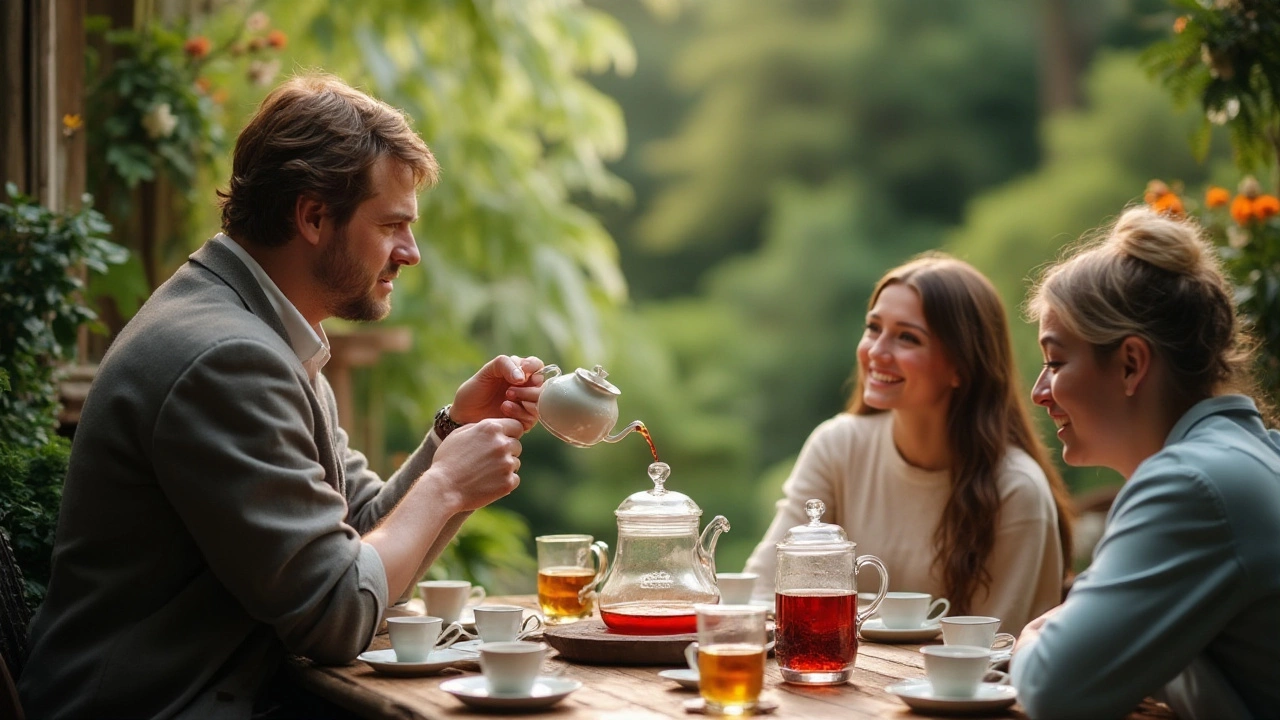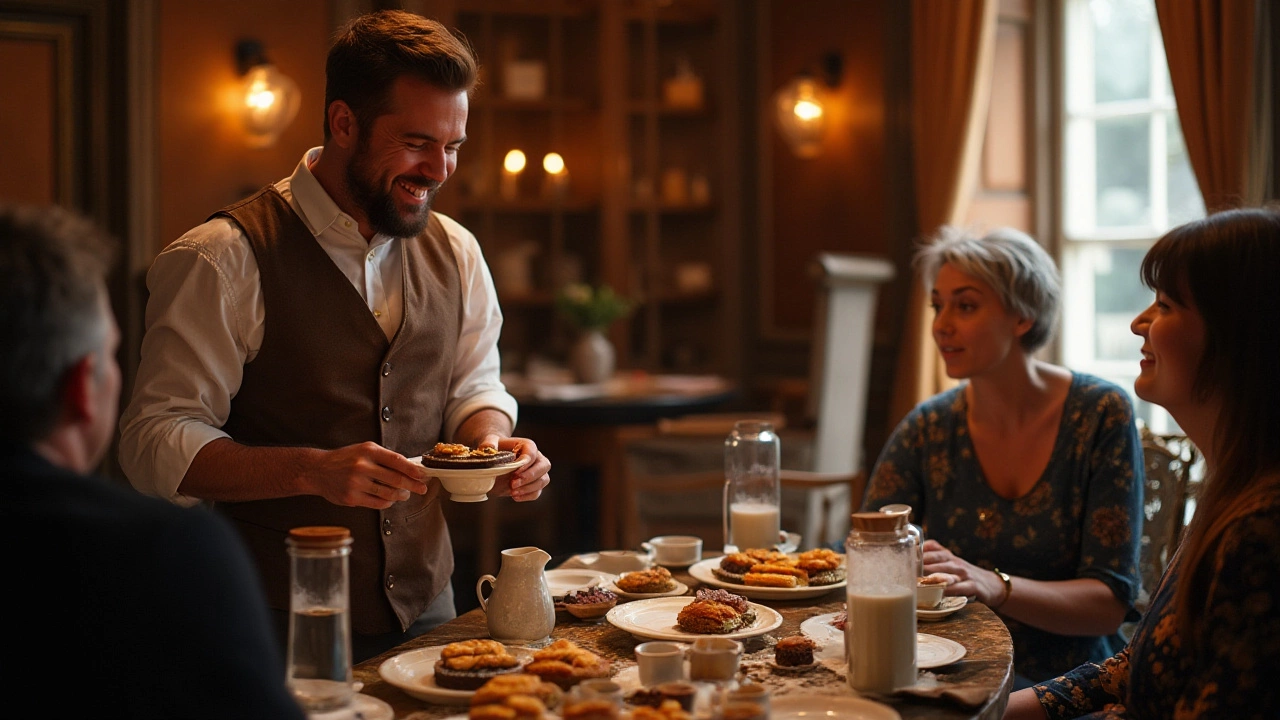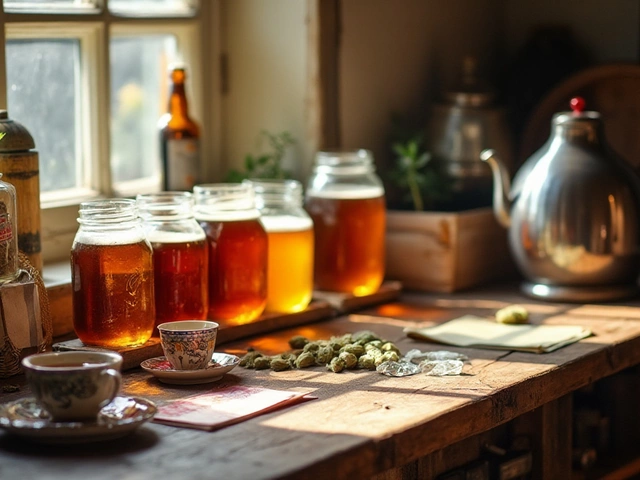The world of tea is vast and fascinating, filled with a deep history and a wide variety of flavors. Have you ever wondered if there are professionals dedicated to mastering this art? Indeed, the answer is yes. Enter the tea sommelier.
Much like their wine counterparts, tea sommeliers possess an encyclopedic knowledge of teas from around the globe. They play a crucial role in the increasingly popular world of tea tasting, helping to refine our palates and guide our journeys through the diverse tea landscapes.
In this article, we delve into what it truly means to be a tea sommelier. We'll explore their rise in prominence, the extensive training they undergo, and the skills they wield to navigate the nuanced world of tea tasting. Whether you're looking to enhance your tea experience or simply curious about this unique profession, join us as we uncover the secrets of the tea sommelier.
- The Rise of the Tea Sommelier
- Training and Skills Required
- Tea Tasting Techniques
- How to Find a Tea Sommelier
The Rise of the Tea Sommelier
The emergence of the tea sommelier as a recognized profession mirrors the growing appreciation for the complexity and depth of tea itself. In recent years, tea has shifted from a mere alternative to coffee into a celebrated beverage that commands respect and admiration. This transformation is largely due to the expanding interest in single-origin teas and artisanal blends, which demand not only knowledge but a refined sense of taste. As the modern consumer becomes increasingly discerning, the role of the tea sommelier has grown in both significance and demand. These experts are now sought after to educate both individuals and businesses in the rich, nuanced world of tea.
The journey of becoming a tea sommelier requires dedication and passion, similar to the path of sommeliers in the wine industry. It involves a comprehensive understanding of various aspects of tea, from the cultivation of tea plants to the complexities of tea preparation and service. This progression has been encouraged by elite training programs and certifications from institutions like the World Tea Academy and the Tea and Herbal Association of Canada, which offer courses that cover every facet of tea, including health benefits and cultural significance. As this field gains momentum, we're witnessing a surge in tea sommeliers who bring a fresh perspective and depth of knowledge to the art of tea.
Interestingly, the relaxation and mindfulness aspects of tea drinking align well with contemporary wellness trends, further bolstering the rise of the tea sommelier. As one anonymous tea expert once said,
"Tea is more than just a drink; it's an experience that engages all the senses."This holistic view resonates with today's consumers, who are not just seeking a product, but an enriched experience. The expertise of a tea sommelier provides a bridge to this heightened level of appreciation, allowing people to savor the story behind each cup. From taste hints that vary with temperature to the complexities stemming from different regions, the involvement of a tea sommelier can transform a simple tea session into an enlightening occasion.
The demographic embracing this tea renaissance is diverse, spanning all ages and interests. Whether it's millennials exploring new flavors or older generations rediscovering the joys of tea, the appeal is broad and enduring. This growing enthusiasm is reflected in specialty tea shops and cafes worldwide, where teas are presented with a degree of ceremony akin to that of wine. As this trend continues to sway hearts and taste buds globally, the presence of a skilled tea sommelier amplifies the experience, converting spaces into sanctuaries of tea culture.

Training and Skills Required
Becoming a tea sommelier is no simple feat. The journey demands dedication, passion, and a thirst for knowledge. A good starting point for aspiring sommeliers is familiarizing themselves with the various types of teas such as black, green, oolong, white, and pu-erh. Each tea type is distinct, with unique characteristics derived from the specific plant varietals, growing conditions, and processing techniques. Understanding these nuances is vital to mastering the craft.
Formal education is often the next step in the path to becoming a tea expert. Institutions around the world offer certification programs specifically tailored for tea professionals. These courses delve deeply into topics including tea history, botany, cultivation practices, and more. In many programs, particularly those in areas with rich tea traditions like China and Japan, students are also taught the art of tea ceremonies which reveal much about the cultural significance of tea. One respected source, the World Tea Academy, provides a structured learning pathway, emphasizing the balance between theory and practical skills.
A developing sommelier's skill set extends far beyond book knowledge. Sensory training is crucial, honing the ability to distinguish even the slightest differences in taste and aroma. This specialized skill is refined through a great deal of practice and is often tested through blind tastings. A tea sommelier must also be adept at pairing teas with food, understanding how different flavors interact with one another. As the famous tea author James Norwood Pratt once said,
"True knowledge of tea comes with the endless discoveries that each new cup brings."
Other key skills include a deep understanding of the health benefits linked to different types of tea. These insights provide sommeliers with the ability to make well-informed recommendations to those seeking specific health outcomes. Strong interpersonal skills are another essential element, enabling sommeliers to impart their extensive knowledge to others clearly and engagingly. It is this combination of scientific understanding and interpersonal finesse that elevates a tea sommelier from a mere tea expert to a true bearer of the tradition.
There's also a practical side to becoming a tea sommelier; learning proper brewing techniques and understanding water quality are aspects often overlooked by beginners. The precise measure of tea leaves, the right temperature, and brewing time can dramatically alter the flavor profile of a tea, making it crucial for a professional to control these factors with precision. Those who excel in this field often take time to explore different tea-growing regions first-hand, further deepening their understanding of tea production and forming personal connections with the world of tea makers.
For those committed to excellence, participating in tea conventions and competitions can be incredibly beneficial. These events provide networking opportunities with other professionals and allow sommeliers to benchmark their skills against their peers. Some might even choose to share their knowledge by teaching or consulting, which helps in refining their own understanding as they introduce others to the compelling world of tea. It's clear, the path of a tea sommelier is as diverse and complex as the flavors found in every cup of tea.

Tea Tasting Techniques
Tasting tea is a refined art, akin to savoring the finest wines. A tea sommelier's approach to tasting involves a harmonious blend of senses to fully appreciate the complexity of this beloved beverage. Begin with visual inspection; the appearance of the leaves provides initial clues about the tea's story. The shape, color, and texture can indicate how the tea was processed and hint at the flavor profile that might follow.
Brewing is the next critical step and one that requires precision. A tea sommelier knows that water temperature and steeping time are vital. For instance, green teas require slightly cooler water compared to black teas to avoid bitterness. A precise steep often unveils the tea’s true character. As the brew infuses, the aroma unfolds. The olfactory senses play a significant role, as the fragrance can be indicative of freshness, quality, and nuances within the leaves.
Flavor identification is the heart of tea tasting. A sip should be held in the mouth and moved around to allow the taste buds to recognize the five basic tastes—sweet, sour, bitter, salty, and umami. A skilled sommelier detects these subtleties and more, discerning floral hints, smokey tones, or even grassy undertones. As renowned tea expert Jane Pettigrew once said, “Tea is liquid wisdom.”
"Tea is liquid wisdom." - Jane Pettigrew
A tea sommelier also evaluates mouthfeel—the texture of the tea as it rolls over the palate. It could be described as astringent, creamy, or even sharp. This sensation contributes to the overall experience and impression of the tea. As they breathe gently through the nose during tasting, sommeliers enhance the aroma and taste, creating a multi-sensory evaluation.
Finally, assessing the aftertaste or the lingering flavors that remain after swallowing is crucial. These lasting notes can vary from sweet or minty to earthy and complex. The finish of a tea tells an additional layer of its quality and character.
For beginners aspiring to improve their tasting skills: keep a tea tasting journal. Record observations about each tea's appearance, aroma, taste, and mouthfeel. Over time, this practice deepens understanding and aids in recalling past experiences. Engage with other tea enthusiasts to share insights and develop a more profound appreciation for this ancient beverage. Through immersion in such practices, anyone can refine their palate and embrace the vast world of tea with the expertise of a tea sommelier.

How to Find a Tea Sommelier
Finding a tea sommelier can be an exciting venture, especially for those looking to deepen their understanding of this nuanced world. In recent years, the profession has gained significant recognition, with sommeliers now available across various platforms. One straightforward approach is to explore local tea houses or specialized tea shops, as many of these establishments employ trained sommeliers who can guide your tasting experience. These experts are often eager to share their extensive knowledge, introducing enthusiastic tea lovers to a range of varieties, from the subtle nuances of white teas to the robust flavors of pu-erh.
Beyond brick-and-mortar locations, the digital realm offers a rich repository of resources. Several online directories and platforms list certified tea sommeliers, making it easier for you to connect with them without geographical constraints. Websites dedicated to tea culture might feature reviews and recommendations that can lead you to highly rated professionals. Additionally, social media has become a valuable tool in the tea community. Platforms such as Instagram and LinkedIn can serve as excellent ways to discover sommeliers who frequently share their expertise through posts, virtual tastings, and even webinars.
For those willing to engage more personally, attending tea festivals or expos can be a fruitful avenue. These events often host a multitude of tea specialists, providing ample opportunities to meet sommeliers face-to-face. Here, you can witness their skills firsthand, indulge in curated tasting sessions, and discuss your preferences and queries. The community experience of these gatherings also allows for networking with other tea enthusiasts who may have recommendations based on their own experiences.
Finally, consider reaching out to tea associations or institutions that offer sommelier certification. These organizations, such as the Specialty Tea Institute or the International Tea Masters Association, often have a robust database of graduates who have met rigorous training standards. They can provide verified information on reputable sommeliers who have gone through extensive training to hone their craft.
"Tea calls for an appreciation of subtlety," says Jane Pettigrew, a recognized tea expert. "Finding a knowledgeable guide can transform your journey into this complex world."


